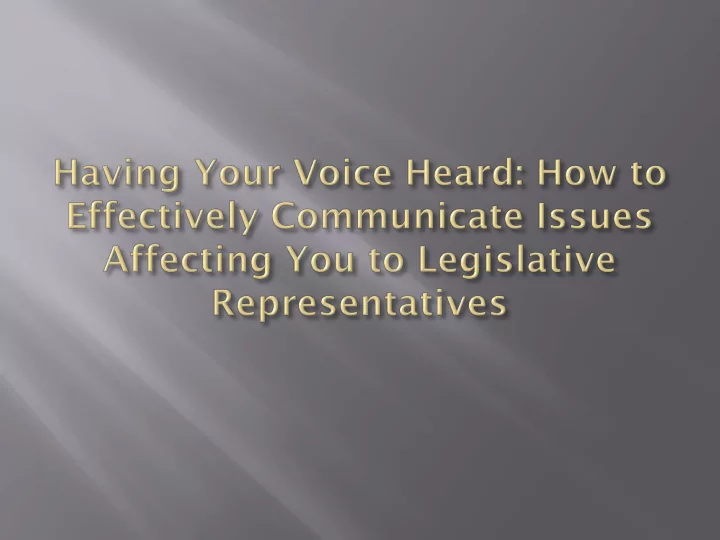

Debra L. Wentz, Ph.D., CEO of NJAMHAA Randy Thompson, Director of Public Affairs
The New Jersey Association of Mental Health and Addiction Agencies, Inc. (NJAMHAA) is a statewide trade association representing nonprofit behavioral health agencies founded in 1951. Represents 180 hospital-based and freestanding providers of mental health and substance use treatment services throughout New Jersey. NJAMHAA members help children and adults with mental health and substance use issues more than one million times annually. Employ approximately 98,000 members of New Jersey’s workforce
NJAMHAA’s mission is to champion opportunities that advance its members’ ability to deliver accessible, quality, efficient and effective integrated behavioral healthcare services to consumers who have mental illnesses and/or substance use disorders, and their families. NJAMHAA is committed to recovery and wellness for all people.
Presentation Overview: How to engage Legislative Representatives and their staff to advance your advocacy. Understand the Legislative process and opportunities for advocacy within that process. Understand the New Jersey Budget Cycle Give you tools to successfully advocate. Questions and Answers Role Play
Legislature : Two Houses and Membership Power Structure Committee Structure
Senate: Senate President Senate Majority Leader Chairs of Key Committees Assembly: Speaker of the Assembly Assembly Majority Leader Chairs of Key Committees
Senate: Budget and Appropriations Community and Urban Affairs Education Health, Human Services and Senior Citizens Judiciary Law and Public Safety Labor State Government, Wagering, Tourism and Historic Preservation
Assembly: Appropriations Budget Health and Senior Services Human Services Judiciary Labor Law and Public Safety Regulated Professions Military and Veterans’ Affairs Regulatory Oversight and Gaming Women and Children (NEW)
Idea Developed A legislator decides to sponsor a bill, sometimes at the suggestion of a constituent, interest group, public official, or the Governor. The legislator may ask other legislators in the same House to join as co-sponsors.
The Office of Legislative Services (OLS) drafts language at the direction of the legislator. Introduction and First Reading: During a session, the legislator gives the bill to the Senate Secretary or Assembly Clerk, who reads the bill's title aloud. Bill is printed and made available to the public.
Committee Reference Posted by Committee Chair Committee may Amend Bill “Die in Committee” Advocacy Opportunity Second Reading Bill has Cleared Committee Bill has Been Referenced Without Committee Review Can be Amended on the Floor Third Reading – FULL VOTE!
Note on the Third Reading Read Aloud and Considered on the Floor Cannot go Through 2 nd and 3 rd Reading on Same Day Without a Super-Majority Vote
Second House Identical Process Same Version Must Pass BOTH Houses If Bill is Amended in One House It is Returned to the Other House Until Identical Versions Pass Pass Both Houses – Off to the Governor’s Office
Governor’s Options Sign Bill No Action – Bill Becomes Law in 45 Days Conditional Veto “Pocket Veto” – Last 10 days of Legislative Session (allows the bill to be vetoed without direct action) Absolute Veto Requires Super-Majority to Override
The New Jersey Budget Cycle operates on a Fiscal Calendar Year (ex. FY 2015) The fiscal year runs from July 1 st – June 30 th The budget follows the regular legislative process with some additional constitutional requirements
Governor has two constitutionally required addresses to the State Legislature: State of the State Address – 2 nd Tuesday of the year Budget Address – On or before 4 th Tuesday of the year Budget must be passed and signed into law by July 1st
Governor Introduces Proposed Budget Legislature holds hearings on proposed budget Public testimony Budget resolutions Legislature introduces its Budget Bill Goes to Governor for action after passing both houses
Governor Sign Budget – becomes law Veto Budget – continues legislative process Line item veto – eliminate specific lines of funding Legislature would need a super-majority to override any vetoes
Know Your Representative Get to Know Their Staff Write Effective Advocacy Letters Meeting Request Why You Are Important Why Your Issues Matter to Your Representative
Be Prepared, Be Early, Be Flexible Have a Realistic Agenda Issues Clearly Layed Out Know In Advance Who Will Speak on Each Topic Have Identified Solutions and Actions to Request Have Realistic Expectations
Reinforce Your Message by Following Up Early An Effective Follow Up Letter Thanks for the Meeting Re-cap any Promise of Action Tie Into the Importance of the Issue Offer Yourself as a Partner and a Resource
Letter to the Editor Public Hearings
New Jersey Association of Mental Health and Addiction Agencies (NJAMHAA) www.NJAMHAA.org New Jersey State Legislature http://www.njleg.state.nj.us/ Governor Christie’s Office http://nj.gov/governor/
Recommend
More recommend